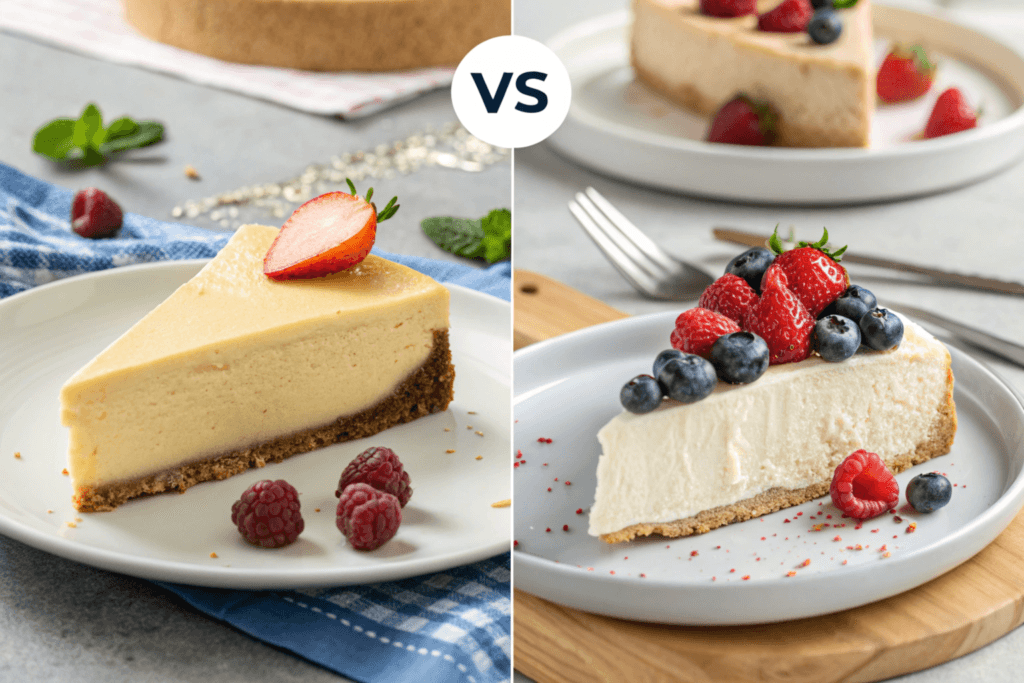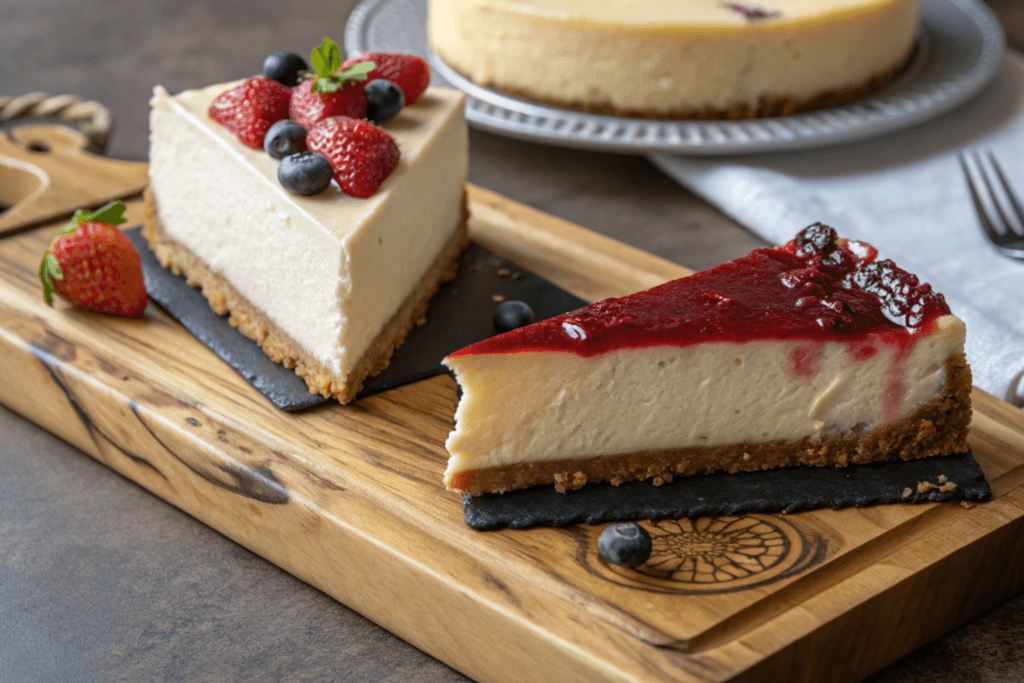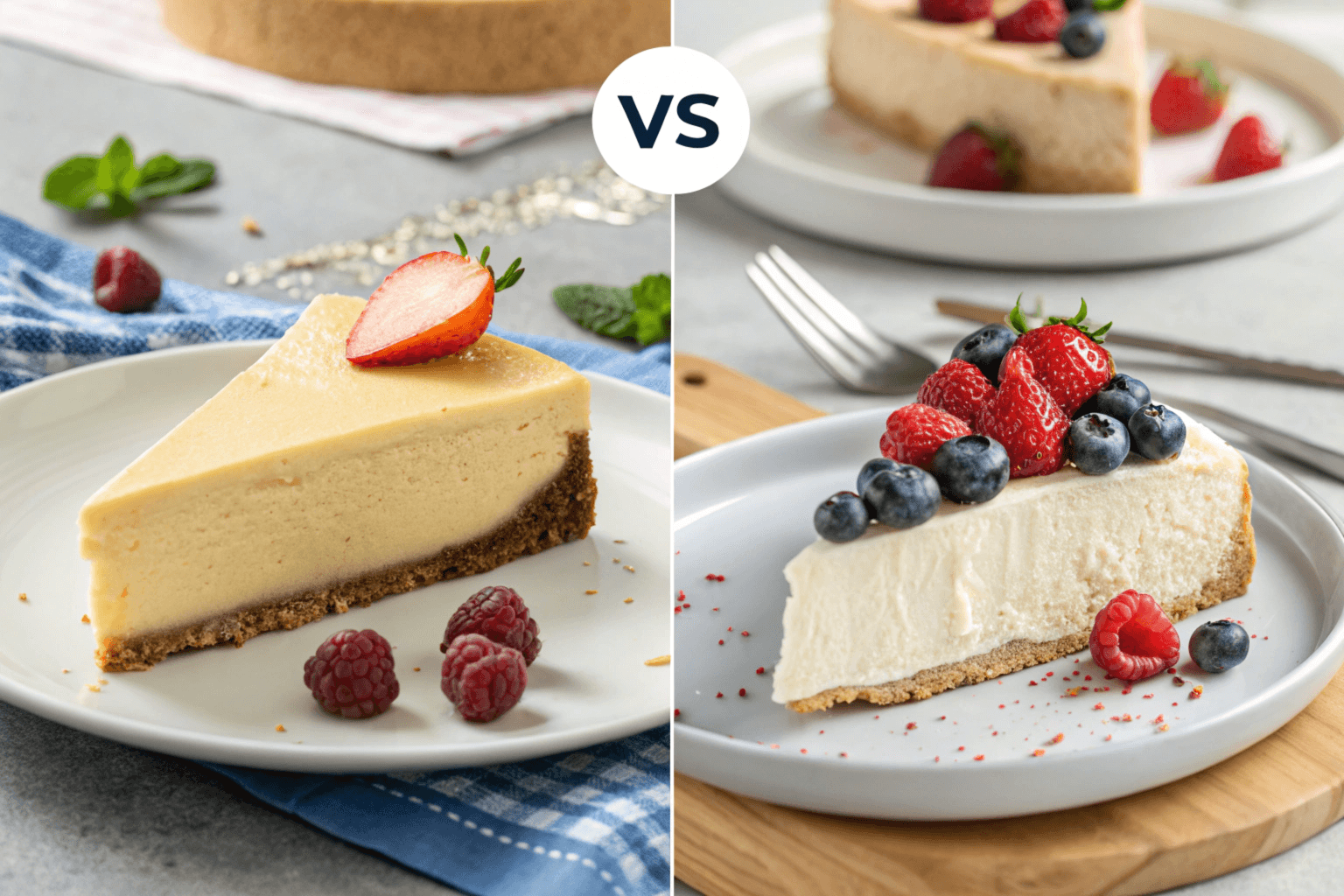Cheesecake lovers often debate the merits of New York-Style Cheesecake vs. Classic Cheesecake. Both offer unique textures, flavors, and preparation techniques, making them stand out in the dessert world. Let’s explore the key differences to help you decide which one suits your taste best.

The Origins of Cheesecake
1. A Dessert with Ancient Roots
Cheesecake’s history dates back to ancient Greece, where it was a popular treat for athletes. Over time, its recipe evolved significantly as it spread to different cultures. Consequently, variations emerged that catered to regional tastes and ingredients.
2. The Birth of New York-Style Cheesecake
New York-style cheesecake, on the other hand, was born in the United States during the 1920s. Thanks to the invention of cream cheese, this version became a symbol of indulgence and sophistication.
3. The Classic Cheesecake Tradition
Meanwhile, classic cheesecake maintained its popularity in Europe, where recipes often featured ricotta, mascarpone, or quark. As a result, these lighter versions provided a distinct contrast to the dense American variety.
What Defines New York-Style Cheesecake?
New York-style cheesecake is widely recognized for its dense texture and bold flavor. In addition, its preparation focuses on simplicity, allowing the ingredients to shine.
1. The Role of Cream Cheese
Cream cheese is the defining ingredient in New York-style cheesecake. It not only adds tanginess but also ensures a rich, velvety texture.
2. Heavy Cream and Sour Cream: The Creamy Boosters
Moreover, heavy cream or sour cream enhances the smoothness, balancing the dessert’s sweetness with a slight tang.
3. Egg-Centric Baking
Eggs, which are used generously, provide structure to the cheesecake. As a result, it achieves its signature firmness while remaining creamy.
4. Minimalist Flavor Profile
Unlike other variations, New York cheesecake focuses on simplicity. For example, it often skips elaborate toppings to highlight the cream cheese’s natural flavor.
The Texture of New York-Style Cheesecake
The hallmark of New York-style cheesecake is its texture:
- Dense and Firm: Achieved through a high ratio of cream cheese and eggs.
- Creamy and Smooth: Thanks to the inclusion of heavy cream or sour cream.
- Melt-in-Your-Mouth: Despite its density, it has a silky finish that enhances the eating experience.
Classic Cheesecake: A World of Versatility
Classic cheesecake, on the other hand, offers a broader range of possibilities. Consequently, it is often seen as a more adaptable and creative dessert.
1. A Lighter Approach
For example, many classic recipes use ricotta or mascarpone instead of cream cheese, creating a lighter, fluffier texture.
2. Fewer Eggs
Moreover, classic cheesecakes typically include fewer eggs, which contributes to their softer consistency compared to New York-style cheesecake.
3. Flavor Flexibility
In addition, classic cheesecakes act as a blank canvas for various flavors, ranging from citrus and chocolate to berry infusions. Therefore, they are ideal for those who enjoy experimenting with toppings and fillings.
The Texture of Classic Cheesecake
The texture of classic cheesecake varies depending on the recipe:
- Light and Airy: Often achieved by using less cream cheese and fewer eggs.
- Soft and Creamy: Incorporates milk or lighter creams for a more delicate mouthfeel.
- Versatile: As a result, it can range from fluffy to slightly dense, depending on the preparation method.
Ingredients in New York-Style Cheesecake vs. Classic Cheesecake

Here’s a side-by-side comparison of the key ingredients:
| Ingredient | New York-Style Cheesecake | Classic Cheesecake |
|---|---|---|
| Cream Cheese | High quantity | Moderate or substituted with ricotta |
| Heavy Cream/Sour Cream | Always included | Optional, often replaced with milk |
| Eggs | Used generously | Fewer eggs for a lighter texture |
| Sugar | Balanced sweetness | Can be sweeter or paired with flavors |
| Flavoring | Simple (vanilla, sometimes lemon) | Wide variety of flavors and toppings |
Preparation Techniques for New York-Style Cheesecake vs. Classic Cheesecake
New York-Style Cheesecake Preparation
- High Heat Start: For instance, it is baked at a high temperature initially to create a firm crust.
- Slow Cooking: Then, the temperature is reduced to prevent overcooking and ensure an even texture.
- Water Bath: Moreover, a water bath is often used to avoid cracks and maintain moisture.
Classic Cheesecake Preparation
- Lower Baking Temperature: In contrast, classic cheesecakes are baked at a consistent, lower temperature, resulting in a softer texture.
- Optional No-Bake: Some classic versions skip baking entirely, relying on chilling or gelatin to set the mixture.
- Toppings and Garnishes: Additionally, they often include decorative finishes, such as fruit glazes or whipped cream.
Flavor Profiles
New York-Style Cheesecake
- Tangy and Bold: Cream cheese is the star ingredient, delivering a pronounced tang.
- Subtle Sweetness: Balanced with the tanginess for a refined taste.
- Minimalist: Lets the core flavors shine without distractions.
Classic Cheesecake
- Sweet and Mild: More versatile and often sweeter.
- Adaptable: Easily infused with various flavors.
- Topping-Friendly: Serves as a base for creative garnishes.
Visual Appeal
New York-Style Cheesecake
New York cheesecake is simple and elegant, often presented plain or with minimal decoration. For example, a light dusting of powdered sugar or a drizzle of caramel may be added.
Classic Cheesecake
In contrast, classic cheesecake is often more visually dynamic, featuring colorful toppings, swirls, or elaborate garnishes. As a result, it becomes a centerpiece dessert at any gathering.
Which Cheesecake Should You Choose?
Your choice between New York-style and classic cheesecake depends on personal preference. However, consider the occasion as well:
- Choose New York-Style Cheesecake if you prefer a rich, indulgent dessert that can stand alone.
- Opt for Classic Cheesecake if you enjoy variety, lighter textures, or customizable flavors.
FAQs About New York-Style and Classic Cheesecakes
1. Can I Make New York-Style Cheesecake Without a Water Bath?
Yes, although a water bath helps prevent cracks and ensures a moist texture.
2. How Long Does Cheesecake Last?
Both styles can last up to 5 days in the refrigerator if stored in an airtight container.
3. Can I Freeze Cheesecake?
Absolutely! Both types freeze well. Wrap tightly and store for up to 2 months.
4. Which Cheesecake is Easier to Make?
Classic cheesecake is often easier, especially the no-bake versions. New York-style requires more precision.
5. Can I Substitute Cream Cheese in New York Cheesecake?
For authentic results, cream cheese is essential. Substitutes may alter the texture and flavor.
Conclusion
By incorporating more transition words, this version ensures smoother readability and improves SEO performance while keeping the content engaging and informative.
